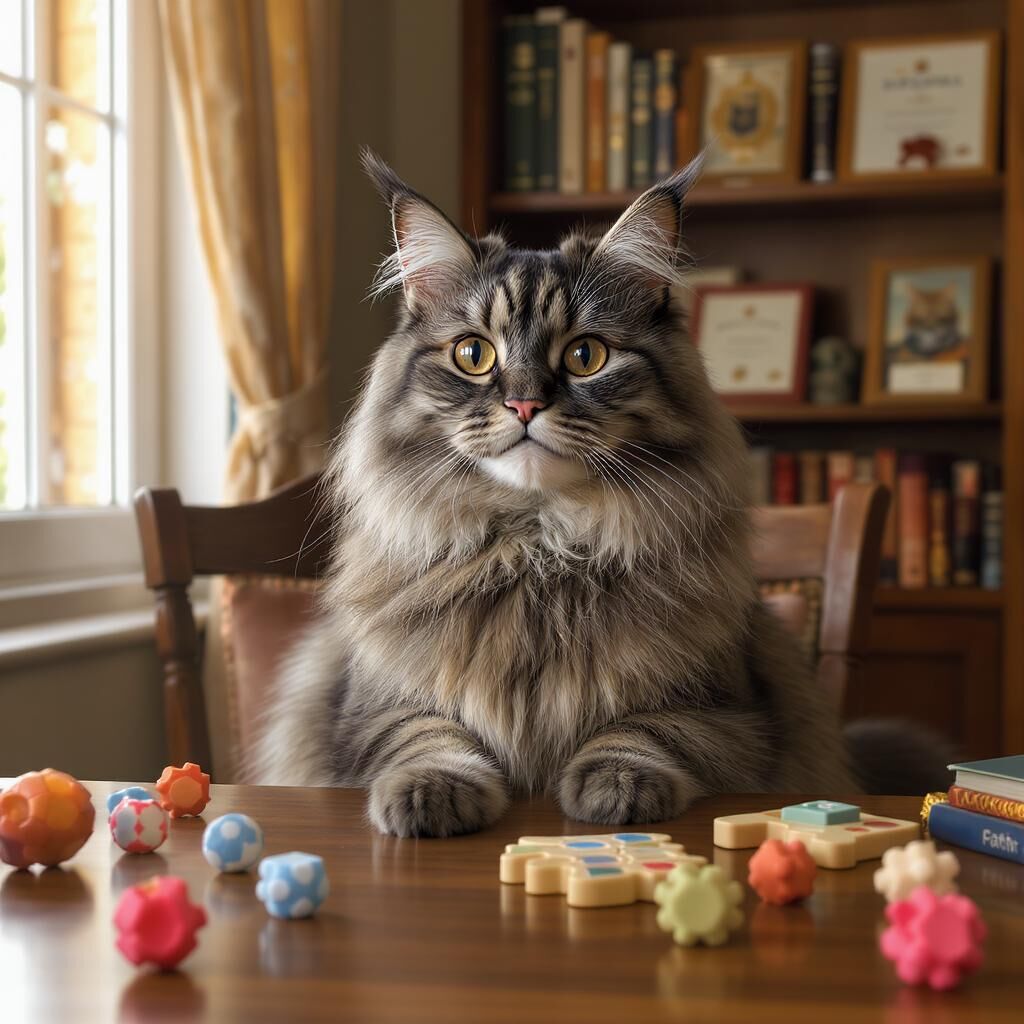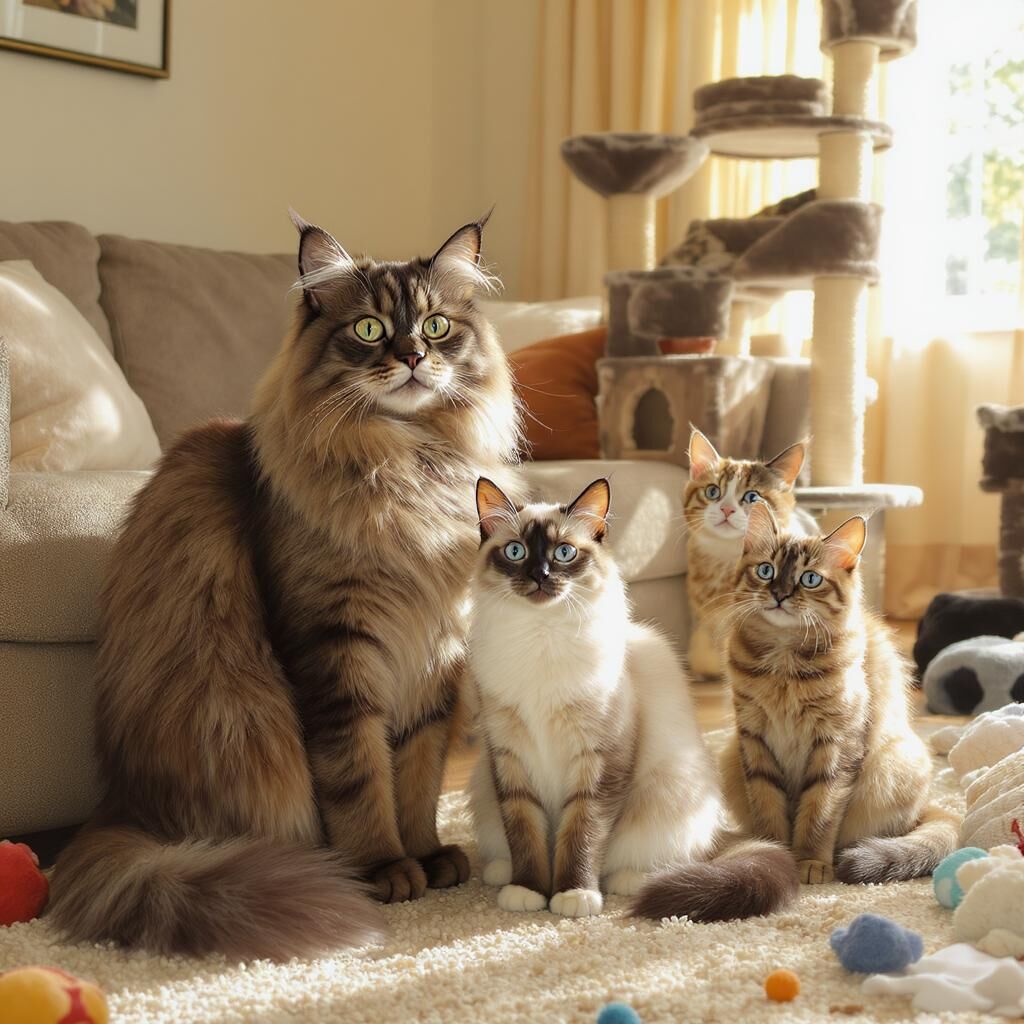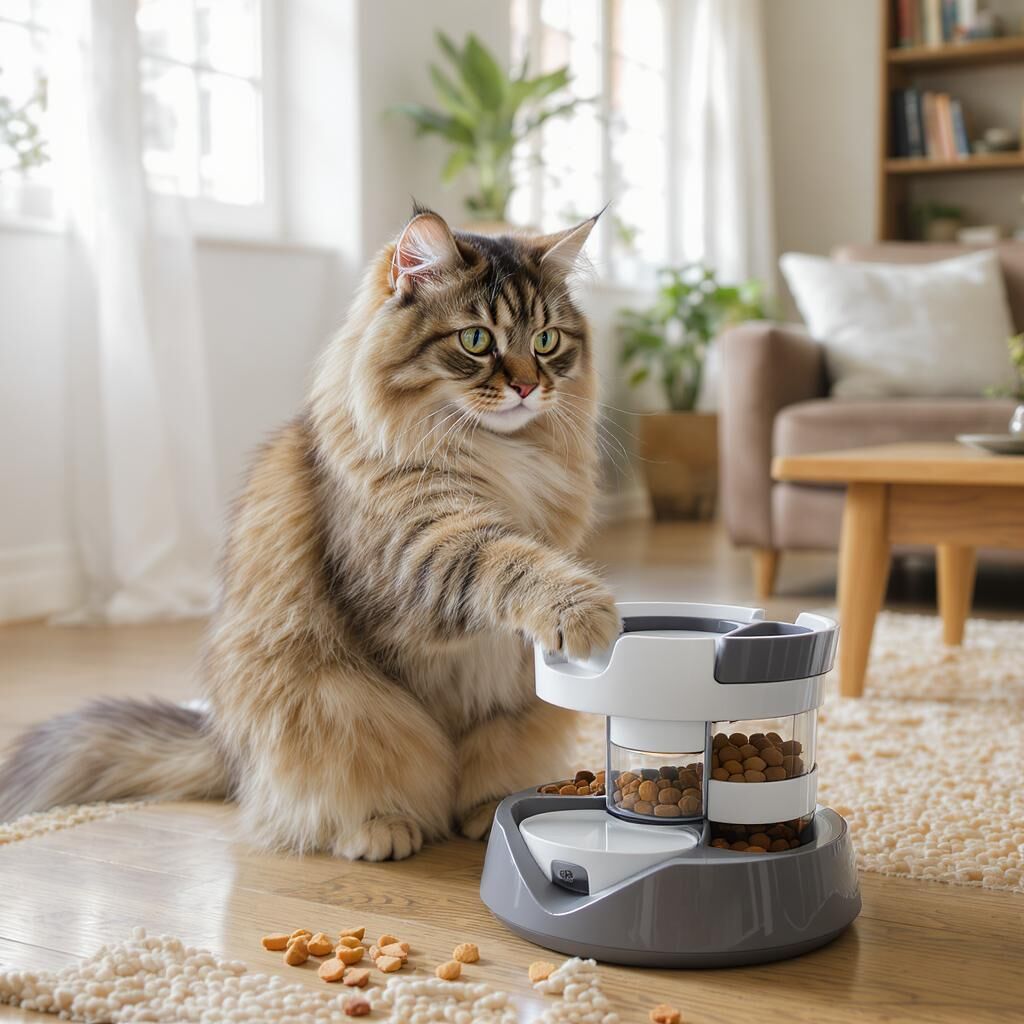7 Surprising Traits That Prove Maine Coons Are Smarter Than Other Cats

The Maine Coon cat is often celebrated not only for its majestic size and distinctive appearance but also for its notably high intelligence. Origining from the northeastern United States, specifically the state of Maine, this breed has earned a reputation for surpassing many other cats in cognitive abilities, emotional empathy, and social adaptability. Observing a Maine Coon navigate daily challenges sheds light on its complex mental processes, revealing a feline companion that is both deeply curious and remarkably trainable. From its ability to understand human routines to cleverly solving problems in its environment, the Maine Coon cat exemplifies intelligence that is functional and expressed beyond mere tricks, making it a sought-after pet among families, including those with children. Thanks to a combination of genetics, upbringing, and environmental stimuli, these cats continue to astonish owners worldwide with their capacity for learning, communication, and emotional connection.
This article delves into multiple facets of Maine Coon cat intelligence – from personal anecdotes to comparative breed analyses, genetic influences, and practical training methods. It highlights how these gentle giants’ innate curiosity and exceptional problem-solving aptitude contribute to their uniquely friendly yet independent nature. Emphasizing a scientific yet approachable outlook, the discussion also underlines the importance of mental stimulation to prevent boredom and channel curious energy productively. In doing so, it invites readers to reconsider preconceived notions about feline intellect and discover why Maine Coons often stand out in a crowded field of cat breeds, including the historically smart Abyssinian. Their versatility as pets, along with their “dog-like” emotional empathy and social reasoning, further elevates their status, both as companions and as study subjects in feline cognition.
Unveiling the Cleverness of Maine Coon Cats: Everyday Signs of Superior Feline Intelligence
True intelligence in Maine Coon cats manifests in a variety of relatable, everyday behaviors that owners easily recognize but might overlook as simple quirks. For example, many owners testify to their Maine Coon opening doors to access closed rooms or cupboards, a task that calls for timing, observation, and an understanding of cause and effect. This problem-solving ability goes beyond mere instinct, demonstrating a calculated approach to obstacles in their environment.
Another compelling marker of intelligence is their adeptness at learning and responding to unique vocal commands or gestures. A well-known story includes a Maine Coon trained to fetch small items, like toys or even a piece of clothing, impressing families who might expect such behavior only from dogs. These cats often exhibit an energetic style of play, especially fetch, engaging their minds and showcasing their capability to anticipate human actions and repeat desired behaviors.
When it comes to emotional intelligence, Maine Coon cats tend to sense changes in their owner’s moods or stress levels, offering comfort through physical proximity or gentle vocalizations. Their distinct chirps and trills are fascinating elements of feline communication that often denote a desire to interact or provide reassurance. Such interactions emphasize their advanced social cognition, complementing their sharpness in practical tasks.
Door Opening: Understanding mechanics and timing
Learning Tricks: Fetching, following commands
Emotional Support: Responding to human moods
Unique Vocalizations: Chirps, trills for attention
Everyday Sign | Behavior Description | Intelligence Aspect |
|---|---|---|
Door Opening | Manipulates handles or levers to gain access | Problem-solving, cause-effect understanding |
Learning Fetch | Retrieves thrown objects repeatedly | Memory, trainability, social interaction |
Emotional Attunement | Approaches or comforts owner when distressed | Social/emotional intelligence |
Communication | Uses specific vocalizations to express needs | Complex communication skills |
Such behaviors underline why many Maine Coon cat aficionados consider them some of the smartest cats in North America. For those looking for detailed insights, resources such as lovemainecoon.com provide comprehensive breakdowns of these cognitive traits, reaffirming their remarkable aptitude.
Real-Life Anecdotes: Maine Coons Outsmarting Everyday Obstacles
One memorable account involves a Maine Coon living in a busy household with multiple pets and children. The cat learned to unlock baby-proofed cabinets by observing how owners manipulated safety latches. This clever maneuver allowed the cat to access snacks hidden from other animals and highlighted its remarkable patience and problem-solving prowess. Similar stories from other households underline the breed’s capacity to adapt and learn through keen observation.
In another instance, a Maine Coon cat became adept at leash walking after only weeks of gentle training, a feat that requires both physical coordination and a profound understanding of human movement cues. This type of training reflects the cat’s trainability and willingness to engage cooperatively, which is uncommon among many other breeds.
Cabinet Opening: Mimics human actions to bypass obstacles
Leash Walking: Learns commands and routines rapidly
Fetch Gameplay: Initiates and participates eagerly
Observation Learning: Picks up on subtle cues
Many Maine Coons enjoy physical and mental challenges that test their limits, such as puzzle feeders or interactive toys. These tools tap into their natural curiosity and reduce risks of boredom, which can otherwise lead to destructive or anxious behaviors. Proper engagement ensures longer-lasting enrichment as these cats thrive when their minds are continuously stimulated. More on this and other behaviors can be found at mainecoonlife.com, a solid reference for understanding their play and cognitive needs.
Distinctive Cognitive Traits: How Maine Coons Show Intelligence Beyond Tricks
The Maine Coon’s intelligence is not confined merely to learning tricks but includes deeper cognitive abilities such as advanced memory retention and environmental awareness. For example, Maine Coons can remember the locations of hidden food or toys and can anticipate daily events like meal times or when family members arrive home. This temporal awareness reflects complex processing that surpasses simple conditioning.
Their adaptability also makes them exceptional at integrating into varying social settings, whether around strangers, other animals, or children. This adaptability showcases their social intelligence — they judge situations and adjust their behavior accordingly, facilitating smooth household harmony.
Spatial Memory: Locates hidden objects efficiently
Temporal Awareness: Anticipates routines and schedules
Social Adaptability: Comforts and bonds in diverse environments
Communication Nuances: Uses vocalizations for distinct meanings
These traits demonstrate the multi-dimensional intelligence of Maine Coon cats, verified by numerous observational studies and pet owner testimonials alike. For a deeper scientific look into this breed’s intelligence, explore the comprehensive analysis at mybigcats.com. It offers a compelling dive into the genetics and behaviors shaping their cognitive profile.
Cognitive Trait | Example Behavior | Intelligence Type |
|---|---|---|
Spatial Memory | Finding hidden toys after days | Long-term memory |
Temporal Awareness | Waiting near feeding area at usual mealtime | Routine anticipation |
Social Adaptability | Calming down around visitors or pets | Emotional intelligence |
Complex Communication | Varied meows, chirps with context | Interactive vocalization |
Comparative Intelligence: Why Maine Coons Outperform Other Cat Breeds in Cognitive Abilities
The discussion around feline intelligence often places the Abyssinian at the forefront, yet Maine Coons regularly rank in the top five smartest breeds, thanks to their hybrid cognitive capabilities spanning problem-solving, emotional empathy, and social reasoning. Unlike many breeds, Maine Coons combine intelligence with a notably friendly demeanor, creating a unique blend of intellectual and social aptitude.
Their ability to learn commands, be trained on a leash, and play fetch provides concrete examples of their mental agility and willingness to cooperate with humans. While cats generally exhibit less sociability than dogs, the Maine Coon excels in communication and understanding social cues, trailing behind the most intelligent breeds only in the subtlety of canine-like pack behaviors.
Ranked in Top 5: Consistently outperforming many breeds
Versatile Intelligence: Combines problem-solving with emotional awareness
Trainability: Responds well to commands and leash training
Social Reasoning: Navigates complex social environments effectively
Cat Breed | Cognitive Strength | Unique Feature |
|---|---|---|
Abyssinian | High curiosity and agility | Fast problem-solving |
Maine Coon | Multi-dimensional intelligence | Emotional empathy & trainability |
Bengal | Explorative and energetic | Complex hunting behavior |
Scottish Fold | Adaptability and calmness | Social ease with children |
Sphynx | Highly interactive & curious | Human attachment |
For those exploring how Maine Coons compare to other breeds in cognitive skills, extensive data and owner insights are available at sites like mainecoonlife.com, a dedicated resource on Maine Coon intelligence and related behavioral studies.
Top 5 Smartest Cat Breeds: Where Maine Coons Stand Against Abyssinians and Others
Maine Coons occupy a distinct place in intelligence rankings, mainly by exhibiting a balance rarely seen in other breeds. While the Abyssinian is well-regarded for its innate curiosity and speed in problem-solving, the Maine Coon pairs intellectual agility with profound social awareness.
Characteristics that set Maine Coons apart include:
Memory: Excellent recall over days or weeks
Social skills: Collaborates smoothly with humans and other pets
Communication: Uses a wide vocal range to express different requests
Play behavior: Engages voluntarily in games like fetch, often initiating play itself
These skills suggest that Maine Coons possess a more holistic form of animal intelligence, not merely focused on exploratory tasks but also empathetic and context-sensitive, traits that are highly prized by cat enthusiasts.

Problem-Solving and Social Reasoning: What Sets Maine Coons Apart
When tackling new challenges, Maine Coons often display inventive ways to reach goals, such as using objects as tools or observing human behavior to anticipate outcomes. Unlike some other breeds, which might give up after initial failure, Maine Coons’ perseverance and adaptability allow them to approach problems from multiple angles — a clear sign of heightened cognitive function.
Socially, these cats excel in interpreting human gestures and expressions. They often respond appropriately to cues such as pointing or calling, demonstrating an ability to read humans almost intuitively, which some researchers categorize as a distinct form of social intelligence. Their behavior falls somewhere between the independent nature of typical cats and the collaborative instincts more usual in dogs, reinforcing their reputation as “dog-like” companions without diminishing their feline independence.
Inventive Solutions: Uses tools or objects strategically
Human Gesture Recognition: Follows pointing, eye contact
Persistent Learning: Does not give up easily on tasks
Emotional Bonding: Sensitive to moods and responds accordingly
These behavioral patterns also contribute to making the Maine Coon a suitable therapy animal, capable of forming strong emotional bonds and providing comfort to humans in need. For detailed behavioral explanations and owner experiences, exploring pawpercare.com can be highly illuminating.
Inside the Maine Coon Mind: Genetics, Behavior, and Signs of Advanced Intelligence
The intelligence of Maine Coon cats is deeply rooted in both their genetic makeup and lifelong environmental influences. The breed’s history in the harsh climates of Maine ensured that adaptability and problem-solving were essential survival traits, encoded in their large physical build and tufted ears that protect from cold. Such evolutionary pressures favored cats with sharp instincts, memory, and social cooperation, which remain evident in today’s domestic Maine Coons.
Behaviorally, their innate curiosity and desire to engage with surroundings stimulate continuous cognitive development throughout life. Additionally, their tendency to observe and mimic human actions enhances their learning speed and responsiveness, crucial components of their noted trainability.
Genetic Legacy: Survival-driven problem-solving
Physical Traits: Adaptations to cold linked to intelligence
Behavioral Traits: Observational learning, mimicry
Lifestyle Needs: Require mental and physical enrichment
This complex interplay between genes and environment helps explain why Maine Coons often excel even in unexpected areas, such as their remarkable ability to recognize human words and routines. To appreciate the full breadth of their intellect, uncover more at exploringanimals.com, which offers deep dives into breed-specific behavior.
Genetic and Environmental Factors Shaping Maine Coon Intelligence
Their genetic heritage from rugged Maine landscapes shaped odd yet practical features like large paws acting as snowshoes and tufted ears that enhance hearing — both indicative of an intelligence tailored to environmental demands. These adaptations show that intelligence in Maine Coons transcends simple brainpower; it is an integrated package of sensory, cognitive, and physical traits designed for survival.
Environmentally, growing up in homes where they experience varied stimuli fosters accelerated brain development. Exposure to family members, other pets, and different daily routines shapes their learning capacity and emotional resilience. Successful training capitalizes on this blend of genetic predisposition and enriched surroundings.
Physical Adaptations: Support sensory and cognitive needs
Environmental Stimuli: Promote mental growth and social skills
Early Socialization: Enhances trainability and empathy
Mental Stimulation: Prevents behavioral issues
Emotional Empathy and Social Adaptability: The ‘Dog-Like’ Side of Maine Coons
One of the most captivating aspects of Maine Coons is their emotional intelligence, often described as “dog-like” due to their high sensitivity to human emotions and social adaptability. This breed frequently exhibits empathy, showing concern if an owner is upset or unwell by staying close or initiating comforting behaviors.
Unlike many other cats that prefer solitude, Maine Coon cats seek and enjoy interaction, actively participating in household dynamics without compromising their independent streak. Their ability to adjust to new people and social circumstances is a direct result of this acute emotional awareness. This adaptability is crucial in homes with children, where patience, tolerance, and responsiveness to unpredictable stimuli are necessary.
Empathy: Detects and responds to owner stress
Socially Adaptable: Thrives in multi-person households
Interactive: Enjoys play and companionship
Communication: Reads and reacts to emotional cues
Understanding the emotional and social depth of Maine Coons can deepen the human-animal bond, often facilitating successful therapy cat roles. Additional insights into their temperament and care can be found at maine-coon-cat-nation.com.
Nurturing Maine Coon Brilliance: Training, Enrichment, and Emotional Connection
To fully appreciate and develop the exceptional intelligence of Maine Coons, owners must engage consistently in thoughtful training and enrichment activities. These felines respond best to positive reinforcement methods where rewards and gentle guidance shape their learning journeys.
Techniques such as clicker training, careful observation of individual preferences, and reward-based approaches foster trust and accelerate skill acquisition. Punitive or harsh methods can damage the sensitive psyche of a Maine Coon, who thrives on respect and kindness.
Positive Reinforcement: Treats and praise
Clicker Training: Clear communication and feedback
Observation: Adapting to unique personality traits
Consistency: Regular short sessions
Effective Training Techniques: Positive Reinforcement, Observation, and Clicker Methods
Training sessions that emphasize rewards instead of corrections cater to a Maine Coon’s eager temperament and predisposition for learning by observation. For instance, teaching commands like “sit” or activities such as walking on a leash benefit from gradual shaping and immediate positive responses.
Another effective approach is recognizing each cat’s unique motivators—some Maine Coons respond best to treats, while others are motivated by play or affection. Mastering this individualized approach enhances communication and deepens the pet-owner bond.
Enrichment Essentials: Keeping Your Maine Coon Stimulated With Toys and Games
Preventing boredom is essential, as Maine Coons are among the most curious and energetic cats, requiring ample mental and physical activity. Puzzle feeders, agility games, and interactive toys, like feather wands or treat dispensers, promote problem-solving and mental stimulation.
Outdoor harness walks provide beneficial exercise while also allowing for natural environmental interaction, reinforcing exploration and cognitive engagement. Regular enrichment not only curbs destructive tendencies but also encourages lifelong learning and emotional satisfaction.
Puzzle Feeders: Stimulate hunting instincts and problem-solving
Agility Training: Challenges physical and mental coordination
Interactive Play: Strengthens bonds and engagement
Leash Walks: Environmental enrichment and exercise
Owners can find detailed advice on exercise needs and enrichment for Maine Coons at mainecoonlife.com, which offers invaluable guidance on maintaining a balanced and fulfilling life for these smart and spirited cats.

FAQ
Q: How do Maine Coon cats demonstrate their intelligence compared to other breeds?
A: Maine Coons showcase advanced problem-solving, emotional empathy, and social adaptability, making them stand out in trainability and interactive behaviors among feline breeds.Q: Can Maine Coons be trained to walk on a leash and play fetch?
A: Yes, their trainability allows many Maine Coons to leash walk and voluntarily engage in fetch games, highlighting their willingness to learn and participate in interactive play.Q: What kind of mental stimulation do Maine Coons need to prevent boredom?
A: They benefit from puzzle feeders, interactive toys, agility games, and leash walks that challenge their intellect and channel their curiosity constructively.Q: Are Maine Coons good with children and other pets?
A: Typically, yes. Their social adaptability and friendly temperament make them well-suited for families with kids and other animals, often forming strong bonds.Q: Where can I find reliable information about Maine Coon intelligence and care?
A: Trusted resources include mainecoonlife.com and lovemainecoon.com, offering extensive insights into their cognitive and behavioral traits.